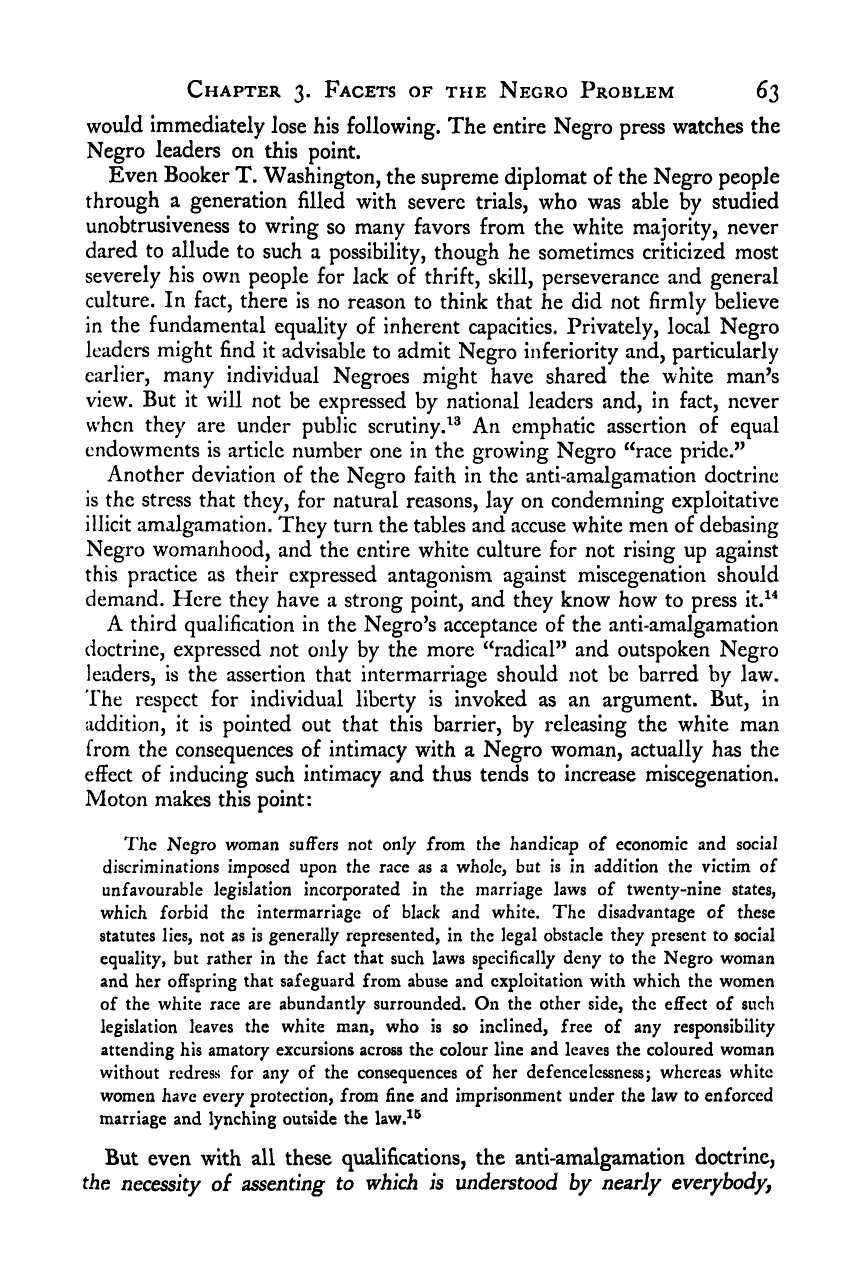Note: Gunnar Myrdal died in 1987, less than 70 years ago. Therefore, this work is protected by copyright, restricting your legal rights to reproduce it. However, you are welcome to view it on screen, as you do now. Read more about copyright.
Full resolution (TIFF) - On this page / på denna sida - I. The Approach - 3. Facets of the Negro Problem - 4. The “Rank Order of Discriminations”

<< prev. page << föreg. sida << >> nästa sida >> next page >>
Below is the raw OCR text
from the above scanned image.
Do you see an error? Proofread the page now!
Här nedan syns maskintolkade texten från faksimilbilden ovan.
Ser du något fel? Korrekturläs sidan nu!
This page has never been proofread. / Denna sida har aldrig korrekturlästs.
Chapter 3. Facets of the Negro Problem 63
would Immediately lose his following. The entire Negro press watches the
Negro leaders on this point.
Even Booker T. Washington, the supreme diplomat of the Negro people
through a generation filled with severe trials, who was able by studied
unobtrusiveness to wring so many favors from the white majority, never
dared to allude to such a possibility, though he sometimes criticized most
severely his own people for lack of thrift, skill, perseverance and general
culture. In fact, there is no reason to think that he did not firmly believe
in the fundamental equality of inherent capacities. Privately, local Negro
leaders might find it advisable to admit Negro Inferiority and, particularly
earlier, many individual Negroes might have shared the white man’s
view. But it will not be expressed by national leaders and, in fact, never
when they are under public scrutiny.’® An emphatic assertion of equal
endowments is article number one in the growing Negro ^^race pride.”
Another deviation of the Negro faith in the anti-amalgamation doctrine
is the stress that they, for natural reasons, lay on condemning exploitative
illicit amalgamation. They turn the tables and accuse white men of debasing
Negro womanhood, and the entire white culture for not rising up against
this practice as their expressed antagonism against miscegenation should
demand. Here they have a strong point, and they know how to press it.’^
A third qualification in the Negro’s acceptance of the anti-amalgamation
doctrine, expressed not only by the more ^Vadical” and outspoken Negro
leaders, is the assertion that intermarriage should not be barred by law.
’Ihe respect for individual liberty is invoked as an argument. But, in
addition, it is pointed out that this barrier, by releasing the white man
from the consequences of intimacy with a Negro woman, actually has the
effect of inducing such intimacy and thus tends to increase miscegenation.
Moton makes this point:
The Negro woman suffers not only from the handicap of economic and social
discriminations imposed upon the race as a whole, but is in addition the victim of
unfavourable legislation incorporated in the marriage laws of twenty-nine states,
which forbid the intermarriage of black and white. The disadvantage of these
statutes lies, not as is generally represented, in the legal obstacle they present to social
equality, but rather in the fact that such laws specifically deny to the Negro woman
and her offspring that safeguard from abuse and exploitation with which the women
of the white race are abundantly surrounded. On the other side, the effect of such
legislation leaves the white man, who is so inclined, free of any responsibility
attending his amatory excursions across the colour line and leaves the coloured woman
without redress for any of the consequences of her de fence lessnessj whereas white
women have every protection, from fine and imprisonment under the law to enforced
marriage and lynching outside the law.’®
But even with all these qualifications, the anti-amalgamation doctrine,
the necessity of assenting to which is understood by nearly everybody,
<< prev. page << föreg. sida << >> nästa sida >> next page >>